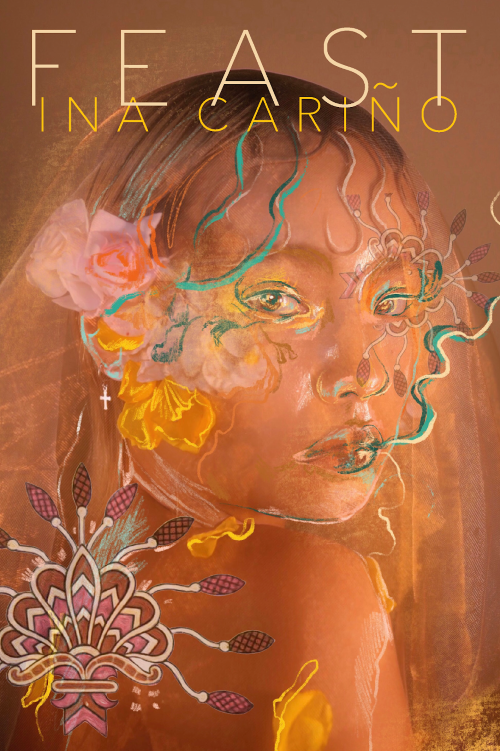a brown sister told me someone told her white people smell like milk so I took a good long whiff of one brought him home with melet him sleep in my bed he kept me safe kept me from lonely so I kept him from spoiling from curdling kept himat night he dripped milk into me my fingers gripping his bony limbs my brown awash in milk rinsed & cooled I slurped it upmaybe he loved me but only as white boys love guavas from a warm country pink-soft insides fragrant othermaybe I loved him but only as a brown girl loves a white thing a so-called pure thing makintab a shiny lie one dayI met his onion-skin mother his candle-stump father we talked about Asia you know that giant country onion-mother saidmy English was great no accent! candle-father said I looked exotic are you—Polynesian? they may as well have asked what it’s liketo wake up smelling like dung like tarantulas burnt rice or flies in summer heat smelling like monsoon mildew mudstink bugs circling instead they asked if I’d tried dog asked if I’ve ever once burned rice because I must be so good at itI don’t need a recipe they all laughed so later that night I took my white boy to my lola’s house pulled down a jarof black vinegar sukang itim dipped my tongue in it kissed him you shoulda seen his pale face go see-through chalk dissolvingreverse alchemy now when talk of white people I tell my brown sister baho they stink of milk so I let mine goshe still shakes her head at me says bobo why are you so stupid says I was lucky to be so close to one who smells of milkbut when milk turns sour ferments blooms fetid under the nose the only thing to do is pour it down the drain
Milk
Feature Date
- May 19, 2023
Series
Selected By
Share This Poem
Print This Poem
“Milk” (poem) from Feast by Ina Cariño, Alice James Books, 2023.
Copyright © 2023 by Ina Cariño.
All rights reserved.
Reproduced by Poetry Daily with permission.

Ina Cariño is a FilAm writer with a 2022 Whiting Award for poetry. Their work appears in the American Poetry Review, the Margins, Guernica, Poetry Northwest, Poetry Magazine, the Paris Review Daily, Waxwing, New England Review, and elsewhere. She is a Kundiman fellow and is the winner of the 2021 Alice James Award for Feast, out with Alice James Books (March 2023).
"'To be other is to read badly-/drawn maps,' writes Ina Cariño, 'to hum / with a revolutionary's love song.' I love the vividness of these poems, the language of the senses that's so alive on each page of FEAST. But these poems aren't just beautiful, sensual lyrics. There is more at stake here. Cariño is a kind of poet who claims family and identity with style that's akin to spell-making. 'I dream in a tongue not my own' the poet says—and we see it instantly: Here, even a simple act of cooking rice can become a ceremony, a rhapsody of liberation. All of this is done not with literary pretension but with vulnerability and honesty. If Ina Cariño says 'names are spells,' it is because this poet aims to write actual spells, and not just with the pen, but with breath: ‘I am the last spell, the only song left. deliberate utterance of bone’. Here, we are in presence of something special, I think. Bravo.”
—Ilya Kaminsky, author of Deaf Republic and Dancing in Odessa
“…We are hungry to understand our histories and our families in all their gluttony, temperance, and appetites. We want to know their stomach pangs, their favorite flavors, how they like to eat and how we can prepare that food for them. We are hungry for a poet who can put all this into words. Graciously inviting us through twilight and rain with the guidance of their balintataw, Ina Cariño provides us with this luscious, mystical, defiant Feast.”
—Amanda L. Andrei, Barrelhouse
“Cariño’s collection adeptly grapples with the tensions of existing in the United States as an immigrant and a queer person alongside the beauty of Filipino culture and lineage. Their debut feels boldly autobiographical, and Feast does not hesitate to use the physical body as a canvas to explore these themes. … There is no doubt that Ina Cariño is an important poet of our age, one who will not hesitate to share the stories they find in beautifully gripping detail.”
—Lena M. Tinker, The Harvard Crimson
Poetry Daily Depends on You
With your support, we make reading the best contemporary poetry a treasured daily experience. Consider a contribution today.




